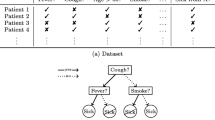Abstract
The two most commonly addressed data mining tasks are predictive modelling and clustering. Here we address the task of predictive clustering, which contains elements of both and generalizes them to some extent. Predictive clustering has been mainly evaluated in the context of trees. In this paper, we extend predictive clustering toward rules. Each cluster is described by a rule and different clusters are allowed to overlap since the sets of examples covered by different rules do not need to be disjoint. We propose a system for learning these predictive clustering rules, which is based on a heuristic sequential covering algorithm. The heuristic takes into account both the precision of the rules (compactness w.r.t. the target space) and the compactness w.r.t. the input space, and the two can be traded-off by means of a parameter. We evaluate our system in the context of several multi-objective classification problems.
Preview
Unable to display preview. Download preview PDF.
Similar content being viewed by others
References
Blockeel, H.: Top-down induction of first order logical decision trees. PhD thesis, Department of Computer Science, Katholieke Universiteit, Leuven (1998)
Blockeel, H., De Raedt, L., Ramon, J.: Top-down induction of clustering trees. In: Proceedings of the 15th International Conference on Machine Learning, pp. 55–63. Morgan Kaufmann, San Francisco (1998)
Blockeel, H., Struyf, J.: Efficient algorithms for decision tree crossvalidation. Journal of Machine Learning Research 3, 621–650 (December 2002)
Clark, P., Niblett, T.: The CN2 Induction Algorithm. Machine Learning 3, 261–283 (1989)
Džeroski, S., Demšar, D., Grbović, J.: Predicting chemical parameters of river water quality from bioindicator data. Applied Intelligence 13(1), 7–17 (2000)
Džeroski, S., Blockeel, H., Grbović: Predicting river water communities with logical decision trees. In: Presented at the Third European Ecological Modelling Conference, Zagreb, Croatia (2001)
Flach, P., Lavrač, N.: Rule induction. In: Berthold, M., Hand, D.J. (eds.) Intelligent Data Analysis, pp. 229–267. Springer, Heidelberg (1999)
Karalič, A., Bratko, I.: First Order Regression. Machine Learning 26, 147–176 (1997)
Kaufman, L., Rousseeuw, P.J.: Finding groups in data: An introduction to cluster analysis. John Wiley & Sons, Chichester (1990)
Langley, P.: Elements of Machine Learning. Morgan Kaufmann, San Francisco (1996)
Lavrač, N., Kavšek, B., Flach, P., Todorovski, L.: Subgroup discovery with CN2-SD. Journal of Machine Learning Research 5, 153–188 (February 2004)
Michalski, R.S.: Knowledge acquisition through conceptual clustering: A theoretical framework and algorithm for partitioning data into conjunctive concepts. International Journal of Policy Analysis and Information Systems 4, 219–243 (1980)
Newman, D.J., Hettich, S., Blake, C.L., Merz, C.J.: UCI Repository of machine learning databases. University of California, Irvine (1998)
Quinlan, J.R.: C4.5: Programs for Machine Learning. Morgan Kaufmann, San Francisco (1993)
Sese, J., Morishita, S.: Itemset Classified Clustering. In: Boulicaut, J.-F., Esposito, F., Giannotti, F., Pedreschi, D. (eds.) PKDD 2004. LNCS, vol. 3202, pp. 398–409. Springer, Heidelberg (2004)
Sese, J., Kurokawa, Y., Kato, K., Monden, M., Morishita, S.: Constrained clusters of gene expression profiles with pathological features. Bioinformatics (2004)
Struyf, J., Dzeroski, S.: Constraint based induction of multi-objective regression trees. In: Bonchi, F., Boulicaut, J.-F. (eds.) KDID 2005. LNCS, vol. 3933, pp. 110–121. Springer, Heidelberg (2006)
Struyf, J., Dzeroski, S., Blockeel, H., Clare, A.: Hierarchical multiclassification with predictive clustering trees in functional genomics. In: Proceedings of Workshop on Computational Methods in Bioinformatics as part of the 12th Portuguese Conference on Artificial Intelligence, pp. 272–283. Springer, Heidelberg (2005)
Suzuki, E., Gotoh, M., Choki, Y.: Bloomy decision tree for multi-objective classification. In: Siebes, A., De Raedt, L. (eds.) PKDD 2001. LNCS, vol. 2168, pp. 436–447. Springer, Heidelberg (2001)
Todorovski, L., Blockeel, H., Dzeroski, S.: Ranking with predictive clustering trees. In: Proceedings of the 13th European Conferende on Machine Learning, pp. 444–456. Springer, Heidelberg (2002)
Torgo, L.: Data Fitting with Rule-based Regression. In: Zizka, J., Brazdil, P. (eds.) Proceedings of the workshop on Artificial Intelligence Techniques (AIT 1995), Brno, Czech Republic (1995)
Author information
Authors and Affiliations
Editor information
Editors and Affiliations
Rights and permissions
Copyright information
© 2006 Springer-Verlag Berlin Heidelberg
About this paper
Cite this paper
Ženko, B., Džeroski, S., Struyf, J. (2006). Learning Predictive Clustering Rules. In: Bonchi, F., Boulicaut, JF. (eds) Knowledge Discovery in Inductive Databases. KDID 2005. Lecture Notes in Computer Science, vol 3933. Springer, Berlin, Heidelberg. https://doi.org/10.1007/11733492_14
Download citation
DOI: https://doi.org/10.1007/11733492_14
Publisher Name: Springer, Berlin, Heidelberg
Print ISBN: 978-3-540-33292-3
Online ISBN: 978-3-540-33293-0
eBook Packages: Computer ScienceComputer Science (R0)




